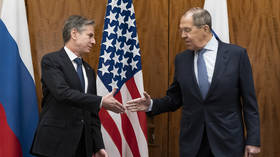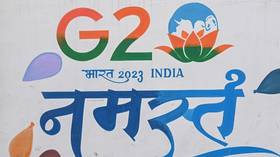Blinken and Lavrov last met in Geneva last January, and spoke by phone in July. Throughout the intervening time, Blinken has maintained that the US will keep up its military support for Ukraine “for as long as it takes,” and Lavrov said in January that a subsequent message he received from Blinken offered no “serious proposals” for resolving the conflict.

The White House is expected to announce another round of military assistance for Ukraine on Friday when President Biden meets with the German chancellor, Olaf Scholz, in Washington, a White House spokesman, John Kirby, said. “It will mostly include ammunitions and munitions the Ukrainians will need for the systems they already have,” Kirby said. He declined to provide additional details on the military package or to say how much it would cost.
Al Jazeera’s Pavni Mittal, reporting from New Delhi, said that the foreign ministers G20 meeting ended on a “tense and divisive note”.
The US has for a long time been “in favor of the escalation of conflicts,” Zakharova said on Thursday. “Diplomacy, unfortunately, has been relegated to the background.”
Blinken and Lavrov meet at G20

"US Secretary of State Antony Blinken and Russian Foreign Minister Sergey Lavrov met on the sidelines of the G20 summit in New Delhi on Thursday. Blinken said he urged Russia to return to the New START arms control treaty, but Moscow has already insisted that Washington’s “hybrid war” on Russia makes serious discussions impossible.
The two diplomats met for around ten minutes. Russian Foreign Ministry Spokeswoman Maria Zakharova told reporters that Blinken “asked for contact” with Lavrov. However, the brief encounter was conducted on the fly and could not be considered “negotiations,” she added.
In his own press conference after the meeting, Blinken said that he reaffirmed the US’ support for Ukraine, raised the possibility of a prisoner exchange for jailed American Paul Whelan, and “urged Russia to reverse its irresponsible decision and return to implementing the New START treaty.”
Russian President Vladimir Putin signed a law this week to suspend the treaty, which was the last remaining nuclear arms agreement between the US and Russia. The treaty placed limits on the number of deployed missiles, bombers, launchers, and warheads each side could possess, and allowed both countries to inspect each others’ nuclear sites.
Earlier this week, Russia’s ambassador to the US, Anatoly Antonov, said that “Washington must reconsider its hostile anti-Russian policy” before Moscow would contemplate a return to the agreement. Given that the US has “launched and dragged its European allies into a large-scale hybrid war against Russia,” and insists on inspecting the same Russian bases that its Ukrainian proxies are attacking “with the help of the Pentagon,” the deal would remain suspended.
Antonov also accused the US of violating the treaty long before Russia’s withdrawal, while Kremlin spokesman Dmitry Peskov said a day later that Washington’s actions prior to the outbreak of conflict in Ukraine – which included rejecting all of Russia’s security requests – showed that “they were not ready to talk about anything with us.”
The US has also accused Russia of breaching the treaty by preventing American inspectors from traveling to its bases. . ." READ MORE
X
.jpeg)

.jpeg)



No comments:
Post a Comment